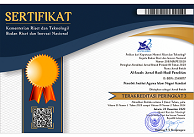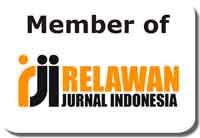Integrasi Kegiatan Masyarakat Budaya Lokal dan Lembaga dalam Pendidikan Toleransi
Abstract
The research explains the form of local wisdom of Bugis culture as a cultural value that characterizes the Palopo people. The local wisdom developed in Palopo City is in line with the pluralistic Palopo culture developing in Indonesia. Palopo people has local wisdom values such as humanizing. These values are always preserved so that they become the glue of religious harmony in Palopo City. The type of this research is ethnography. The research findings show that knowledge and understanding of the cultural traditions of society that contain pluralism allow students to suspend suspicion or even wholly disappear negative things that students have understood about other religions. The concept of pluralism is seen from implementing the cultural philosophy in Palopo, namely Sipakatau, Sipakalebbi, and Sipakaingge. Two universities, IAIN Palopo and Andi Djemma University practice the local wisdom values. The results shows that personally, students who were actively involved in the implementation of local wisdom education felt that they had experienced significant changes. In the aspect of faith, they are increasingly convinced of their religion while still providing adequate space for a good and correct assessment of the truth of the teachings of other religious and cultural beliefs.
Keywords
Full Text:
PDFReferences
Abdullah, Taufik, “Adat and Islam: An Examination of Conflict in Minangkabau”, Indonesia, No. 2 (1966):
Asyanti, Setia, Pendidikan karakter di perguruan tinggi: Sudah terlambatkah? Prosiding Seminar Nasional Psikologi Islami, Surakarta, 21 April 2012.
Bakker, Anton, Ontologi Atau Metafisika Umum: Filsafat Pengada dan Dasar-Dasar Kenyataan, Yogyakarta: Penerbit Kanisius, 1992.
Basyuni, Muhammad M., Kebijaksanaan dan Strategi Kerukunan Umat Beragama Jakarta: Menteri Agama RI, 2006.
Bellah, Robert N. dan Phillip E. Hammond, Varieties of Civil Religion, Yogyakarta: IRCiSoD, 2003.
Bigge, Morris L., Learning Theories for Teachers, USA: Harper and Row, Publisher, Inc, 1982.
Bustaman, Kamaruzzaman -Ahmad, “Contemporary Islamic Thought in Indonesia and Malay World: Islam Liberal, Islam Hadhari, and Islam Progresif”, Journal of Indonesian Islam, Vol. 5, (1) (June 2011): 91.
Carmody, Brendan, “Interreligious Education and the Question of Truth” in Kath Engebretson, etl., International Handbooks of Religion and Education, Springer Science+Business Media B.V. 2010.
Davies, “Religious Education and Social Literacy: the ‘white elephant’ of Australian Public Education” British Journal of Religious Education, 2017.
el-Fadl, Khaled Abou, The Place of Tolerance in Islam, Boston: Beacon Press, 2002.Garah, W. E., R. I. Beekun, A. Habisch, G. Lenssen, C. L. Adaui, “Practical Wisdom for Management from the Islamic Tradition”, Journal of Management Development, 31, (10), (2012).
Gordon, Sheila C. dan Benjamin Arenstein, “Interfaith Education: A New Model for Today’s Interfaith Families”, Springer Science+Business: Media Dordrecht and UNESCO Institute for Lifelong Learning, 2017.
Gustina, Nelvia, “Proses Sosial Antar Kelompok Etnis di Pemukiman Transmigrasi Spontan (Kasus pada Pakon Marang Kecamatan Pesisisr Selatan Kabupaten Lampung Barat Provinsi Lampung) dalam Fakultas Pertanian. Institut Pertanian Bogor, 2002.
Hafd, Abdul, Hubungan Sosial Masyarakat Multietnik di Kabupaten Luwu Sulawesi Selatan, Jurnal “Al-Qalam, Volume 22 Nomor 1 Juni 2016.
Halafoff, Anna, “Social Movements, Cosmopolitanism and Multifaith Engagement” The Multifaith Movement: Global Risks and Cosmopolitan Solutions Springer Netherlands, 2013.
HR. Stiff-William, Widening Lens to Teach Character Education Alongside Standart Curriculum. Abstract. The Clearing House, Vol 83. (4) (2010).
Jean L. Mckechnie, ed., Webster’s New Twentieth Century Dictionary: Unabridged, USA: William Collins Publishers Inc., 1980.
Kali>n, Ibrahim, “Masa>dir al-Tasa>muh}, wa’adam al-Tasa>muh fi al-Islam”, Majalah Adyan (2009).
Maragustam, Mencetak Pembelajar Menjadi Insan Paripurna; Falsafah Pendidikan Islam, Yogyakarta: Nuha Litera, 2010.
Matthes, B. F., Boeginesche Chrestomathie, Amsterdam: 1859.
----------, Over de Ada’s of Gewoonten der Makassaren en Boegineezen, tth.
Moschis, George P., Fon Sim Ong, Masoud Abessi, Takako Yamashita, dan Anil Mathur, “Cultural and Sub-Cultural Differences in Reliability”, Asia Pacific Journal of Marketing and Logistics, Vol. 25, (1) (2013).
Mulyani, Sri, “Islam, Adat, and the State: Matrifocality in Aceh Revisited”, Journal of Islamic Studies al-Jamiah, Vol. 48, (2) (2010/1431).
Muhammadiyah, Hilmi, Perempuan Bugis Naik Haji–Sebuah Tinjauan Antropologis, Depok: Elsas, 2009.
Plesner, Ingvill Thorson, “Promoting Tolerance Through Religious Education” Facilitating Freedom of Religion or Belief: A Deskbook. 2004.
Rais, Za’im, “The Minangkabau Traditionalists’ Response to The Modernist Movement”, disertasi, Montreal: McGill University, 1994.
Saidi, Saleh et al., eds., Sejarah Keberadaan Umat Islam di Bali, (Denpasar: MUI, 2002.
Salahuddin, Patricia Zahira, Character Education in A Muslim School: A Case
Study of A Comprehensive Muslim School’s Curricula, Dissertation, Florida International University, 2011.
Schwartz, It’s Not to Late to Teach College Student about Values. The Chronicle of Higher Education. Vol 46. (40), (2000).
Sheetal R. Shah, The Impact of Acculturation and Religion on Intergenerational Family Conflict for Second Generation Asian Indian Americans, Tesis, Carbondale: Southern Illinois University, 2006.
Sila, “Adlin, Memahami Spektrum Islam di Jawa”, Indonesian Journal for Islamic Studies Studia Islamika, Vol. 18, (3), (2011).
Syukri, Peran Pendidikan di Perguruan Tinggi terhadap Perubahan Perilaku Kaum Intelektual (sosial-Individu). Jurnal Ilmiah Kreatif, Vol 6 (1), (2009).
Todd, Stephen dan Andrew Steele, “Modelling a Culturally Sensitive Approach to Fuel Poverty”, Structural Survey, Vol. 24, (4), (2006).
Watzlawik, Meike, “Cultural Identity Markers and Identity as a Whole: Some Alternative Solutions”, Culture and Psychology, Vol. 18, (2), (2012).
Wijaya, Amrina R, “How Indonesian School System Segregates Believers”, https://magdalene.co/story/how-indonesian-school-system-segregates-believers, Diakses 12 Maret 2021.
Wynne, E. A., and K. Ryan. Reclaiming our schools: A handbook on teaching character, academics, and discipline, New York: Merrill, 1993.
Yunus, Y., & Mukhlisin, Sosial-Budaya: Harmonisasi Agama Dan Budaya Dalam Pendidikan Toleransi. Kalam: Jurnal Agama Dan Sosial Humaniora, 8(2), (2020). 1-26.
DOI: http://dx.doi.org/10.31332/ai.v0i0.2676
Copyright (c) 2021 Jazuli Mukhtar, Yunus Yunus, Ichwan Nugroho

This work is licensed under a Creative Commons Attribution-NonCommercial-ShareAlike 4.0 International License.










